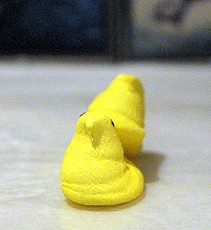Pachinko industry
I'm sure most of you have seen gorgeously decorated buildings like the pic below in front of every station or along every wide road if you have travelled to Japan. This article today is about Pachinko, an infamous gamble that Japanese newspapers or massmedia never report but is responsible for $300 billion underground industry.

Pachinko is the only illegal gamble you won't be arrested with, and it's widespread since the end of WWII. It's a very simple game. You enter the building, buy metal balls which you call "pachinko", flick them with a lever, and drop the flying balls in jackpots. Yes, it's a pinball machine. The actual style is a miniature and upright one. One pachinko parlor shop have more than 100 of machines. The only difference from pinball mahines is that you can retrieve more balls and afterwards change them into cash. Of course you can make your life only if you are very good at it, and indeed, there are those ones.

The lure of this game is outstanding enough to cause tragic accidents where babies are died of heat stroke in the car while their parents are carried away in pachinko parlors. Leaving babies for only 10 minutes is already dangerous! These days those parents tend to be sentenced to a heavy punishment for what they have done. These cases have been seen many times since I was small. It's not rare. Plus it's a waste of money and time.
Aside from most of Japanese anxiety on the prevail of this infamous gamble, the industy has grown to achieve $300 billion dollars. FYI, the medical industry is comparable, $300 billion, and car industry holds $410 billion dollars in Japan (as of 2006). Pachinko industry is a gigantic industry you never thought to be. For example, consider a man spending $100 for 30 minutes game and he played 2 hours. He would lose $400 if in bad luck. Of course he can win $2000 a day, but rarely happens. Those who line up to the door of the parlors in the morning before its open to get a good seat for so-called easy machines NEVER get surplus statistically.
Then why don't massmedia report this fact and alert people? Actually, I personally haven't seen ANY articles or programs that invoke discussion on the pros and cons of pachinko. If nothing is coming out of massmedia, there's a taboo inside it. That's the theme of my blog. In this case as well, the mastermind is zainichi again! In case of pachinko, the structure of the collusion looks to me enigmatic, a manifold among police, zainichi, politicians, North Korea, and mass media.

Finally I found a TV program that barely penetrate the kernel of pachinko industry. "Move" from TV asahi reported that this industyr consists of 50% South Korean owners, 30 to 40% North Korean owners, and 10% Japanese owners.

There was a valuable interview with a president, Han Chang-Woo (韓 昌祐) of the biggest pachinko chain shops "Maruhan". He was ranked 584th among world richest people according to Forbs in 2006. The interview is uploaded to Youtube but held in Japanese, so I'll briefly summarize his speech. His brother, a brick maker, smuggled him into Japan in 1945 just after WWWII because their life was economically hard to continue. He graudated Hosei University in Tokyo, but at that time (1952) the economy in Japan was not in a favorable situation even for Japanese student who graduated from university. He lived from hand to mouth even after graduation. Finally he met pachinko industry and got inclined to enlarge this business. In his interview, he defines pachinko industry as "discriminative occupation". Since no banks were willing to lend money to Zainichi Korean, people like him had to take a job like pachinko that handles money as close as possible.
Links:
The US must not have overlooked this loophole for North Korea's money. The problem of pachinko industry was reported to sanate by Larry M. Wortzel, Ph.D. from The Kathryn and Shelby Cullom Davis Institute in 2003. It goes:
Japan’s 18,000 Pachinko gambling parlors, some 30 percent of which are owned by ethnic North Koreans, bring in annual sales of $280 billion a year. Some of this money is also funneled into North Korea, although Japan is now tightening up on that practice.
LA times also points out the connection to North Korea in Decdmber 2006.


4 Comments:
日本華僑means ethnically Chinese living in Japan.
I think is a great gamble, specially when some players fires a ball up into the machine or whatever they call it, so they ca control the speed too. The ball is one of the most interesting parts about the game. In most cases, the ball falls to the bottom and is lost. Anyway, you did an important contribution here, thanks for explain it.
23jj
This can't truly have success, I suppose so.
Hey listen,
Yesterday, I cleaned my shithole with a Japanese person's face.
After wiping out my shithole, I flushed the crap out in the toilet bowl.
I am happy that I use Japanese people as toilet papers.
Post a Comment
Subscribe to Post Comments [Atom]
<< Home